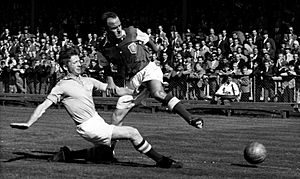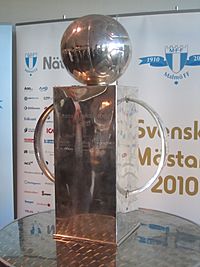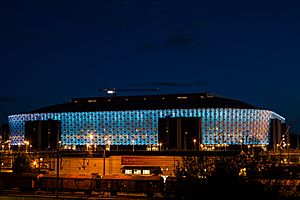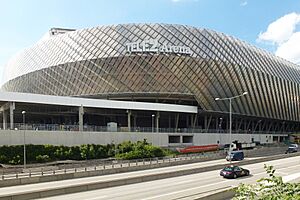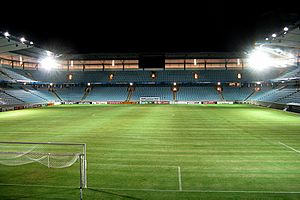Allsvenskan facts for kids
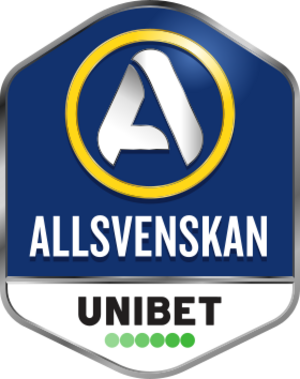 |
|
| Founded | 13 January 1924 |
|---|---|
| Country | Sweden |
| Confederation | UEFA |
| Number of teams | 16 |
| Level on pyramid | 1 |
| Relegation to | Superettan |
| Domestic cup(s) | Svenska Cupen |
| International cup(s) | UEFA Champions League UEFA Europa League UEFA Conference League |
| Current champions | Malmö FF (27th title) (2024) |
| Most championships | Malmö FF (27 titles) |
| Most appearances | Andreas Johansson (445) |
| Top goalscorer | Sven Jonasson (254 goals) |
| TV partners | |
Allsvenskan is Sweden's top professional football league for men. It is often called Fotbollsallsvenskan. The league started in 1924 and is the highest level of football in Sweden.
Allsvenskan works with a system where teams can move up or down between leagues. The league below it is called Superettan. Seasons usually run from late March or early April until early November. There are 16 clubs in the league, and each team plays every other team twice. This means each team plays 30 matches in a season.
Allsvenskan is ranked 23rd among European football leagues. This ranking is based on how well Swedish clubs have done in European competitions over the last five years. It is currently the third-highest ranked league in Scandinavia, after Norway and Denmark. The current champions are Malmö FF, who won the title in the 2024 season.
The three most successful teams in Swedish football history are Malmö FF (with 24 Swedish championships), IFK Göteborg (18 championships), and IFK Norrköping (13 championships). All these teams are still playing in the league. Allsvenskan has been running for 100 seasons without stopping, even during World War II, because Sweden remained neutral.
Contents
- History of Allsvenskan Football
- What it Means to be a Champion
- How the Competition Works
- Awards and Trophies
- Watching Allsvenskan on TV
- Clubs in Allsvenskan
- Stadiums Where Teams Play
- Coaches in Allsvenskan
- Players in Allsvenskan
- Past Winners of Allsvenskan
- Team Achievements and Medals
- All-Time League Table
- Allsvenskan in European Competitions
- Images for kids
- See also
History of Allsvenskan Football
Before Allsvenskan, there was a league called Svenska Serien in the 1910s. It was hard to pay for the games back then. This league eventually split into two groups, one for the south and one for the north.
On January 13, 1924, football clubs met in Stockholm to create a league for the whole country. The first game of the 1924–25 Allsvenskan season was played on August 3, 1924. GAIS was the first team to win this new league, which had twelve teams. In 1931, Allsvenskan started to decide the official Swedish football champions.
In the early years, teams from Norrland and Gotland were not allowed to play in the top league. This rule slowly changed over time. In 1959, the season changed to start in spring and end in autumn, all within one calendar year. The league grew to 14 teams in 1973.
In the 1970s, Malmö FF was very strong. They won Allsvenskan five times and even reached the final of the 1979 European Cup final in 1979. They lost that game to Nottingham Forest.
From 1982 to 1990, the league used a play-off system to decide the Swedish champions. This meant the team that won the regular season wasn't always the champion. In the late 1980s, Malmö FF won the league five times in a row but only two championships because of the play-offs. In 1990, teams started getting three points for a win instead of two. After the play-offs, there were two years (1991 and 1992) with a special "continuation league" called Mästerskapsserien.
In 1993, the league went back to its classic format with 14 teams. IFK Göteborg was very successful in the 1990s, winning five Allsvenskan titles.
In the early 2000s, Djurgårdens IF won three titles. In 2004, Örebro SK had money problems and lost their spot, which was given to Assyriska FF. Since 2008, Allsvenskan has had 16 teams.
The 2024 season was Allsvenskan's 100th year. This was celebrated with special retro jerseys during two match days in August. Malmö FF won this special centennial Allsvenskan, making it their ninth title in the last 15 seasons.
What it Means to be a Champion
The team that wins Allsvenskan is called the Swedish champions and receives gold medals. The team that finishes second gets a "large silver" medal. The third-place team gets a "small silver" medal, and the fourth-place team gets a "bronze" medal.
There were times when the Allsvenskan winner was not considered the Swedish champion. This happened between 1924 and 1930, and again from 1982 to 1992. During these periods, the championship was decided by play-offs or a special continuation league. However, winning Allsvenskan was always a big goal for clubs.
How the Competition Works
Since 2008, there are 16 clubs in Allsvenskan. The season starts in late March and finishes in early November. Each club plays every other club twice, once at home and once away. This makes a total of 30 games for each team.
At the end of the season, the two teams with the fewest points are moved down to Superettan. The top two teams from Superettan are promoted to Allsvenskan. The third-lowest team in Allsvenskan plays a special play-off match against the third-placed team in Superettan. The winner of this play-off gets to play in Allsvenskan the next season.
The team that wins Allsvenskan gets to play in the UEFA Champions League. The second and third-placed teams qualify for the UEFA Conference League. The winner of the Svenska Cupen (Swedish Cup) qualifies for the UEFA Europa League. If the cup winner has already qualified for a European competition through their league position, the fourth-placed team in Allsvenskan gets the extra Conference League spot.
Changes Over Time
The Allsvenskan has changed its format several times since it began.
- From 1924 to 1957, there were 12 teams, playing 22 matches. The season started in autumn and ended in spring.
- In 1957-58, there were 12 teams, playing 33 matches. The season started in autumn and ended the next autumn.
- From 1959 to 1972, there were 12 teams, playing 22 matches. The season started in spring and ended in autumn.
- From 1973 to 1981, the league had 14 teams, playing 26 matches. The season started in spring and ended in autumn.
- From 1982 to 1990, there were 12 teams, playing 22 matches. Play-offs were used to decide the champion.
- In 1991 and 1992, there were 10 teams, playing 18 matches. A special league with six teams decided the champion.
- From 1993 to 2007, there were 14 teams, playing 26 matches.
- Since 2008, there are 16 teams, playing 30 matches. The season starts in spring and ends in autumn.
If teams had the same number of points, the winner was decided by "goal ratio" until 1940-41. After that, it was decided by "goal difference" (goals scored minus goals conceded).
Awards and Trophies
The Championship Trophy
The trophy given to the Swedish champions today is called the Lennart Johanssons Pokal. It was created in 2001 and is named after Lennart Johansson, who used to be the chairman of UEFA. Before this, a different trophy was used from 1903 to 2000. It was replaced because of concerns about its name, which was linked to a person who had connections to a Nazi leader. The Swedish Football Association wanted to avoid any links to Nazism.
Player and Manager Awards
Besides the main trophy and medals for players, Allsvenskan also gives out individual awards. These include:
- Most valuable player
- Goalkeeper of the year
- Defender of the year
- Midfielder of the year
- Forward of the year
- Newcomer of the year
- Manager of the year
These awards are given at an event called Allsvenskans stora pris. There is also an award for the Allsvenskan top scorer.
Watching Allsvenskan on TV
In Sweden, Allsvenskan matches are broadcast by HBO Max. This service started broadcasting the league in May 2024.
Internationally, Allsvenskan matches are shown in many countries. For example, in the UK, they were shown on Premier Sports and FreeSports. In the United States, ESPN broadcasts one match per week. Other broadcasters include DAZN in Austria, Germany, and Switzerland, Sport Klub in Balkan countries, Nova Sports in Cyprus and Greece, TV2 in Norway, and 4th Sports in Iraq.
Clubs in Allsvenskan
A total of 67 clubs have played in Allsvenskan since it started in 1924. No club has played in every single season. AIK has played the most seasons, with 97 out of 101 total seasons. Malmö FF holds the record for playing the most seasons in a row: 63 seasons between 1936–37 and 1999. IFK Göteborg currently has the longest ongoing streak, starting their 49th season in 2025.
The following 16 clubs are competing in Allsvenskan during the 2025 season:
| Club |
Position in 2024 |
First season | Number of seasons | First season of current spell |
Titles | Last title |
|---|---|---|---|---|---|---|
| AIK | 3rd | 1924–25 | 96 | 2006 | 6 | 2018 |
| BK Häcken | 8th | 1983 | 24 | 2009 | 1 | 2022 |
| Djurgårdens IF | 4th | 1927–28 | 69 | 2001 | 8 | 2019 |
| GAIS | 6th | 1924–25 | 55 | 2024 | 4 | 1953–54 |
| Halmstads BK | 12th | 1933 | 57 | 2023 | 4 | 2000 |
| Hammarby IF | 2nd | 1924–25 | 56 | 2015 | 1 | 2001 |
| IF Brommapojkarna | 10th | 2007 | 8 | 2023 | 0 | N/A |
| IF Elfsborg | 7th | 1926–27 | 81 | 1997 | 6 | 2012 |
| IFK Göteborg | 13th | 1924–25 | 92 | 1977 | 13 | 2007 |
| IFK Norrköping | 11th | 1924–25 | 84 | 2011 | 13 | 2015 |
| IFK Värnamo | 14th | 2022 | 3 | 2022 | 0 | N/A |
| IK Sirius | 9th | 1969 | 11 | 2017 | 0 | N/A |
| Degerfors | 1st in Superettan | 1939 | 33 | 2025 | 0 | __ |
| Malmö FF | 1st | 1931–32 | 89 | 2001 | 26 | 2024 |
| Mjällby AIF | 5th | 1980 | 13 | 2020 | 0 | N/A |
| Östers IF | 2nd in Superettan | 1968 | 34 | 2025 | 4 | 1981 |
Stadiums Where Teams Play
Allsvenskan teams play in different stadiums across Sweden. Some stadiums have natural grass, while others use artificial turf. Here are some of the stadiums:
| Team | Location | Stadium | Turf | Stadium capacity |
|---|---|---|---|---|
| AIK | Stockholm | Strawberry Arena | Natural | 50,000 |
| BK Häcken | Gothenburg | Bravida Arena | Artificial | 6,316 |
| Djurgårdens IF | Stockholm | 3Arena | Artificial | 30,000 |
| GAIS | Gothenburg | Gamla Ullevi | Natural | 18,454 |
| Halmstads BK | Halmstad | Örjans Vall | Natural | 10,873 |
| Hammarby IF | Stockholm | 3Arena | Artificial | 30,000 |
| IF Brommapojkarna | Stockholm | Grimsta IP | Artificial | 5,000 |
| IF Elfsborg | Borås | Borås Arena | Artificial | 16,200 |
| IFK Göteborg | Gothenburg | Gamla Ullevi | Natural | 18,454 |
| IFK Norrköping | Norrköping | Nya Parken | Artificial | 16,000 |
| IFK Värnamo | Värnamo | Finnvedsvallen | Natural | 5,000 |
| IK Sirius | Uppsala | Studenternas IP | Artificial | 10,522 |
| Malmö FF | Malmö | Stadion | Natural | 22,500 |
| Mjällby AIF | Hällevik | Strandvallen | Natural | 7,500 |
| Östers IF | Växjö | Visma Arena | Natural | 12,000 |
| Degerfors IF | Degerfors | Stora Valla | Natural | 7,500 |
Coaches in Allsvenskan
To be a coach for an Allsvenskan club, a person must have a special coaching license called a UEFA Pro license. Between 2012 and 2021, clubs in Allsvenskan changed coaches 35 times during the season.
Nanne Bergstrand has coached the most seasons in Allsvenskan, with 21 seasons for four different clubs. Roy Hodgson has won the most league titles as a coach, with seven wins.
Players in Allsvenskan
Most Appearances
Andreas Johansson holds the record for playing the most games in Allsvenskan. He has played 445 matches for Halmstads BK and IFK Norrköping. He broke the record previously held by Sven Andersson in 2024. Sven Jonasson holds the record for playing the most matches in a row, with 332 games for IF Elfsborg between 1927 and 1942.
| Rank | Player | Apps | Goals |
|---|---|---|---|
| 1 | 445 | 20 | |
| 2 | 431 | 0 | |
| 3 | 416 | 0 | |
| 4 | 411 | 24 | |
| 5 | 410 | 254 |
Players from Other Countries
Before 1974, players from other countries were not allowed to play in Allsvenskan. This rule was changed to help the national team become more competitive. On April 13, 1974, Ronald Powell from England became the first foreign player in Allsvenskan. In 1977, Melke Amri from Tunisia was the first non-European player. In 1978, Teitur Þórðarson from Iceland became the first foreign player to win Allsvenskan with Östers IF.
Since 2023, teams can have nine substitute players in their match squad. Out of the 20 players in the squad, a maximum of nine can be players who are not considered "homegrown" (meaning they didn't train at the club's youth academy).
Top Goal Scorers
Sven Jonasson has scored the most goals in Allsvenskan history, with 254 goals in 410 games. Gunnar Nordahl has been the Allsvenskan top scorer four times, which is the most by any player.
Since 1959, a newspaper called Dagens Nyheter gives a watch to the player who scores the first goal of the season's opening match day.
| Rank | Player | Apps | Goals |
|---|---|---|---|
| 1 | 410 | 254 | |
| 2 | 260 | 194 | |
| 3 | 181 | 180 | |
| 4 | 176 | 179 | |
| 5 | 288 | 162 | |
| 267 | 162 |
Past Winners of Allsvenskan
This list shows the winners of the Allsvenskan league. Remember that sometimes the league winner was not officially the Swedish champion, especially in the 1980s when play-offs decided the champion.
- Key
| Season when the league didn't decide the Swedish champions | |
| Season when Swedish champions wasn't awarded at all |
Team Achievements and Medals
Medal Table
At the end of each Allsvenskan season, the players and coaches of the top four teams receive medals. The champions get gold medals, the second-place team gets a "large silver" medal, the third-place team gets a "small silver" medal, and the fourth-place team gets a "bronze" medal. This tradition of giving four medals instead of three might come from the old Swedish Championship, where both losing semi-finalists received bronze medals.
The table below shows the overall medal ranking. Teams get 5 points for a gold medal, 3 points for a large silver, 2 points for a small silver, and 1 point for a bronze. This table is up to date as of the end of the 2024 season.
| Rank | Club | Gold |
Large silver |
Small silver |
Bronze |
Points |
|---|---|---|---|---|---|---|
| 1 | Malmö FF | 27 | 15 | 10 | 8 | 208 |
| 2 | IFK Göteborg | 13 | 13 | 16 | 10 | 146 |
| 3 | IFK Norrköping | 13 | 10 | 5 | 8 | 113 |
| 4 | AIK | 6 | 15 | 13 | 8 | 109 |
| 5 | Helsingborgs IF | 7 | 8 | 8 | 10 | 85 |
| 6 | Djurgårdens IF | 8 | 4 | 11 | 6 | 80 |
| 7 | IF Elfsborg | 6 | 8 | 6 | 9 | 75 |
| 8 | GAIS | 4 | 4 | 4 | 4 | 44 |
| 9 | Östers IF | 4 | 3 | 3 | 3 | 38 |
| 10 | Örgryte IS | 2 | 2 | 6 | 6 | 34 |
| 11 | Halmstads BK | 4 | 2 | 2 | 2 | 32 |
| 12 | Hammarby IF | 1 | 3 | 4 | 3 | 25 |
| 13 | Kalmar FF | 1 | 2 | 2 | 4 | 19 |
| 14 | Åtvidabergs FF | 2 | 2 | - | 1 | 17 |
| 15 | Örebro SK | - | 2 | 2 | 4 | 14 |
| 16 | BK Häcken | 1 | 1 | 2 | 1 | 13 |
| 17 | Degerfors IF | - | 2 | 2 | 2 | 12 |
| 18 | IK Sleipner | 1 | 1 | 1 | 1 | 11 |
| 19 | Landskrona BoIS | - | - | 1 | 3 | 5 |
| Sandvikens IF | - | - | 1 | 3 | 5 | |
| 21 | IFK Malmö | - | 1 | - | - | 3 |
| Jönköpings Södra IF | - | 1 | - | - | 3 | |
| Råå IF | - | 1 | - | - | 3 | |
| 24 | Trelleborgs FF | - | - | 1 | 1 | 3 |
| 25 | IK Brage | - | - | - | 3 | 3 |
Honored Clubs and Stars
In European football, clubs often get a golden star above their badge for winning 10 league titles. In Sweden, this star usually means 10 Swedish championship titles, not just league titles, because the league winner hasn't always been the champion. Stars became more common for Allsvenskan clubs around 2006. AIK was the first to add a star to their kit in 2000.
The table below shows clubs with stars, based on their Swedish championship titles.
- Statistics updated as of the end of the 2024 season
| Club | Swedish championship titles | Allsvenskan titles | Stars | Introduced |
|---|---|---|---|---|
| Malmö FF | 24 | 27 | 2006 | |
| IFK Göteborg | 18 | 13 | 2006 | |
| IFK Norrköping | 13 | 13 | 2006 | |
| AIK | 12 | 6 | 2000 | |
| Djurgårdens IF | 12 | 8 | 2006 | |
| Örgryte IS | 12 | 2 | 2006 |
Cities with Winning Teams
Many different cities in Sweden have had teams win the Allsvenskan title.
| Town or city | League wins | Clubs |
|---|---|---|
| Malmö |
|
Malmö FF (27) |
| Gothenburg |
|
IFK Göteborg (13), GAIS (4), Örgryte IS (2), BK Häcken (1) |
| Stockholm |
|
Djurgårdens IF (8), AIK (6), Hammarby IF (1) |
| Norrköping |
|
IFK Norrköping (13), IK Sleipner (1) |
| Helsingborg |
|
Helsingborgs IF (7) |
| Borås |
|
IF Elfsborg (6) |
| Halmstad |
|
Halmstads BK (4) |
| Växjö |
|
Östers IF (4) |
| Åtvidaberg |
|
Åtvidabergs FF (2) |
| Kalmar |
|
Kalmar FF (1) |
All-Time League Table
The All-time Allsvenskan table, also known as "Maratontabellen" in Swedish, keeps track of all match results, points, and goals for every team that has played in Allsvenskan since 1924–25. It uses three points for a win, even though this system only started in 1990. Matches played in championship play-offs (1982-1990) or the Mästerskapsserien (1991-1992) are not included. This table is accurate as of the end of the 2023 season.
Malmö FF is currently at the top of this all-time table. They took the lead from IFK Göteborg at the end of the 2012 season. IFK Göteborg has spent the most seasons at the top, with 48 seasons as leaders, including a record of 35 seasons in a row between 1938 and 1972. Six clubs have been in the lead at different times since 1925.
|
|
Allsvenskan in European Competitions
Swedish clubs have also competed in major European football tournaments.
Malmö FF was a runner-up in the 1978–79 European Cup. They lost 1–0 to Nottingham Forest in the final.
IFK Göteborg won the UEFA Cup twice. They won in 1981–82 by beating Hamburger SV, and again in 1986–87 by beating Dundee United. IFK Göteborg also reached the semi-finals of the European Cup in 1985–86.
In the 2024-25 season, Djurgårdens IF Fotboll reached the semi-finals of the UEFA Conference League.
The following teams have played in the group stages of the UEFA Champions League, UEFA Europa League, or UEFA Conference League:
| Club | UEFA Champions League | UEFA Europa League | UEFA Conference League | Key victories or draws against Teams from Top 6 European Leagues (from 2000) |
|---|---|---|---|---|
| IFK Göteborg | 1992–93 (SF) 1994–95 (QF) 1996–97 (GS) 1997–98 (GS) |
N/A | N/A | N/A |
| Malmö FF | 2014–15 (GS) 2015–16 (GS) 2021–22 (GS) |
2011–12 (GS) 2018–19 (R32) 2019–20 (R32) 2022–23 (GS) 2024–25 (GS) |
N/A | N/A |
| Helsingborgs IF | 2000–01 (GS) | 2007–08 (R32) 2012–13 (GS) |
N/A | 1-0 & 0-0 FC Internazionale, 0-0 FC Bayern, 1-1 Paris SG |
| AIK | 1999–2000 (GS) | 2012–13 (GS) | N/A | N/A |
| IF Elfsborg | N/A | 2007–08 (GS) 2013–14 (GS) 2024–25 (GS) |
N/A | 1-0 AS Roma, 1-0 OGC Nice, 1-1 S.C. Braga |
| BK Häcken | N/A | 2023–24 (GS) | N/A | N/A |
| Halmstads BK | N/A | 2005–06 (GS) | N/A | 3-2 Sporting CP |
| Östersunds FK | N/A | 2017–18 (R32) | N/A | 1-0 Hertha BSC, 2-1 Arsenal FC, 2-2 Athletic Bilbao |
| Djurgårdens IF | N/A | N/A | 2022–23 (R16) 2024–25 (SF) |
N/A |
Images for kids
See also
 In Spanish: Allsvenskan para niños
In Spanish: Allsvenskan para niños
 | Percy Lavon Julian |
 | Katherine Johnson |
 | George Washington Carver |
 | Annie Easley |


